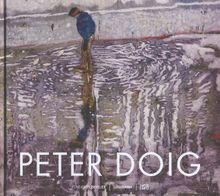| |||||||||||||||||||||||||||||
CURATOR INDEX
|
|
STATUS: Out of stock indefinitely. |
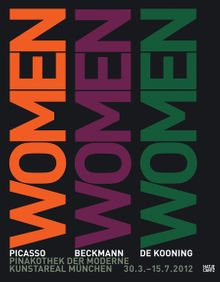 Women
Women
Pablo Picasso, Max Beckmann, Willem de Kooning
Published by Hatje Cantz.
Text by Elisabeth Bronfen, Siri Hustvedt, Michael Köhlmeier, Richard Shiff, Uwe M. Schneede, Carla Schulz-Hoffmann, Feridun Zaimoglu.
PUBLISHER
Hatje Cantz
BOOK FORMAT
Hardcover, 9.25 x 11.75 in. / 348 pgs / 154 color.
PUBLISHING STATUS
Pub Date 8/31/2012
Out of print
DISTRIBUTION
D.A.P. Exclusive
Catalog: FALL 2012 p. 74
PRODUCT DETAILS
ISBN 9783775732673 TRADE
List Price: $75.00 CAD $90.00
AVAILABILITY
Not available
STATUS: Out of print | 00/00/00 For assistance locating a copy, please see our list of recommended out of print specialists |
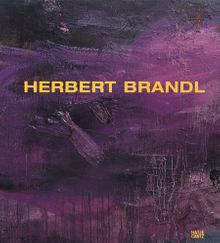 Herbert Brandl
Herbert Brandl
Published by Hatje Cantz.
Edited by Ingried Brugger, Florian Steininger. Text by Herbert Brandl, Richard Shiff, Florian Steininger, Franz West. Interview by Florian Steininger.
PUBLISHER
Hatje Cantz
BOOK FORMAT
Hardcover, 10.75 x 11.75 in. / 208 pgs / 130 color.
PUBLISHING STATUS
Pub Date 4/30/2012
Out of stock indefinitely
DISTRIBUTION
D.A.P. Exclusive
Catalog: SPRING 2012 p. 151
PRODUCT DETAILS
ISBN 9783775732802 TRADE
List Price: $75.00 CAD $99.00
AVAILABILITY
Not available
STATUS: Out of stock indefinitely. |
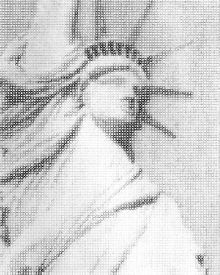 Ewan Gibbs: America
Ewan Gibbs: America
Published by Van Every/Smith Galleries, Davidson College.
Edited by Brad Thomas. Text by Jennifer D. Fletcher, Richard Shiff.
PUBLISHER
Van Every/Smith Galleries, Davidson College
BOOK FORMAT
Slip, Clth, 8.25 x 11.75 in. / 100 pgs / 40 duotone.
PUBLISHING STATUS
Pub Date 4/30/2011
Active
DISTRIBUTION
D.A.P. Exclusive
Catalog: SPRING 2011 p. 146
PRODUCT DETAILS
ISBN 9781890573102 TRADE
List Price: $50.00 CAD $67.50 GBP £45.00
AVAILABILITY
Out of stock
STATUS: Out of stock Temporarily out of stock pending additional inventory. |
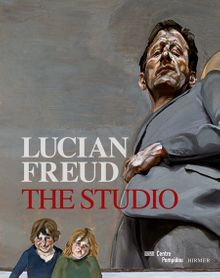 Lucian Freud: The Studio
Lucian Freud: The Studio
Published by Hirmer Verlag.
Foreword by Alain Seban. Preface by Alfred Pacquement. Introduction by Cécile Debray. Text by Éric Darragon, Jean Clair, Laurence des Cars, Philippe Comar, Richard Shiff, Cécile Debray, Elsa Urtizverea.
Grandson of Sigmund Freud, Lucian Freud was born in Germany in 1922, and permanently relocated to London in 1933 during the ascent of the Nazi regime. After seeing brief service during the Second World War, Freud had his first solo exhibition in 1944 at the Alex Reid & Lefevre Gallery in London. Despite exhibiting only occasionally over the course of his career, Freud's 1995 portrait "Benefits Supervisor Sleeping" was sold at auction, at Christie's New York in May 2008, for $33.6 million--setting a world record for sale value of a painting by a living artist.
PUBLISHER
Hirmer Verlag
BOOK FORMAT
Hardcover, 9.25 x 11.75 in. / 256 pgs / 201 color / 43 bw.
PUBLISHING STATUS
Pub Date 5/31/2010
Out of print
DISTRIBUTION
D.A.P. Exclusive
Catalog: FALL 2010 p. 19
PRODUCT DETAILS
ISBN 9783777426914 TRADE
List Price: $65.00 CAD $75.00
AVAILABILITY
Not available
STATUS: Out of print | 00/00/00 For assistance locating a copy, please see our list of recommended out of print specialists |
 Zeng Fanzhi
Zeng Fanzhi
Published by Hatje Cantz.
Preface by Fabien Fryns. Text by Richard Shiff.
PUBLISHER
Hatje Cantz
BOOK FORMAT
Clth, 10 x 11 in. / 256 pgs / 160 color.
PUBLISHING STATUS
Pub Date 11/30/2010
Out of print
DISTRIBUTION
D.A.P. Exclusive
Catalog: FALL 2010 p. 165
PRODUCT DETAILS
ISBN 9783775725323 TRADE
List Price: $75.00 CAD $90.00
AVAILABILITY
Not available
STATUS: Out of print | 00/00/00 For assistance locating a copy, please see our list of recommended out of print specialists |
 Jim Campbell: Material Light
Jim Campbell: Material Light
Published by Hatje Cantz.
Text by John G. Hanhardt, Richard Shiff, Richard Grusin.
PUBLISHER
Hatje Cantz
BOOK FORMAT
Hardcover, 11.25 x 10 in. / 168 pgs / 120 color.
PUBLISHING STATUS
Pub Date 8/31/2010
Out of print
DISTRIBUTION
D.A.P. Exclusive
Catalog: SPRING 2010 p. 144
PRODUCT DETAILS
ISBN 9783775725422 TRADE
List Price: $55.00 CAD $65.00
AVAILABILITY
Not available
STATUS: Out of print | 00/00/00 For assistance locating a copy, please see our list of recommended out of print specialists |
 Robert Lehman Lectures on Contemporary Art No. 4
Robert Lehman Lectures on Contemporary Art No. 4
Published by Dia Art Foundation.
Edited by Lynne Cooke, Karen Kelly and Barbara Schröder. Essays by Dave Hickey, Rosalind Krauss, Ulrich Loock, Alexander Alberro, Jan Avgikos, Richard Shiff, Dirk Snauwaert, Miwon Kwon, Colin Gardner. Foreword by Philippe Vergne.
PUBLISHER
Dia Art Foundation
BOOK FORMAT
Paperback, 5.5 x 8 in. / 200 pgs / 14 color / 88 bw.
PUBLISHING STATUS
Pub Date 10/31/2009
Out of stock indefinitely
DISTRIBUTION
D.A.P. Exclusive
Catalog: SPRING 2010 p. 83
PRODUCT DETAILS
ISBN 9780944521793 TRADE
List Price: $16.95 CAD $24.00 GBP £14.99
AVAILABILITY
Not available
STATUS: Out of stock indefinitely. |
 Per Kirkeby: Louisiana 2008
Per Kirkeby: Louisiana 2008
Louisiana 2008
Published by Louisiana Museum of Modern Art.
Edited by Michael Juul Holm. Text by Richard Shiff, Robert Storr, Maria Fabriciu Hansen, Poul Erik Třjner, Ulrich Wilmes.
PUBLISHER
Louisiana Museum of Modern Art
BOOK FORMAT
Hardcover, 5 x 5 in. / 192 pgs / 127 color / 46 bw / DVD (NTSC).
PUBLISHING STATUS
Pub Date 9/30/2009
Out of stock indefinitely
DISTRIBUTION
D.A.P. Exclusive
Catalog: SPRING 2009 p. 169
PRODUCT DETAILS
ISBN 9788791607578 TRADE
List Price: $40.00 CAD $54.00 GBP £35.00
AVAILABILITY
Not available
STATUS: Out of stock indefinitely. |
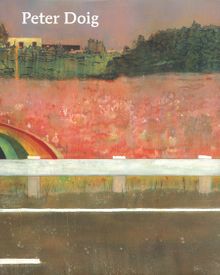 Peter Doig
Peter Doig
Published by Tate/D.A.P..
Edited by Judith Nesbitt. Essay by Richard Shiff.
Published to accompany Doig’s major European traveling retrospective originating at Tate Britain, this extremely satisfying and lavishly illustrated book provides a comprehensive account of the artist’s practice over two decades of extraordinary achievement. It is the most thorough overview of his work to date. With an essay by art historian Richard Shiff, an introduction by Tate curator Judith Nesbitt and an illuminating conversation between Doig and his friend, the artist Chris Ofili, this is an enlightening survey of one of the most influential painters at work today.
Born in Edinburgh in 1959, Peter Doig was raised in Canada and spent two decades in London before moving to Trinidad, where he now lives and works. Doig graduated from St. Martins School of Art in 1983 and the Chelsea School of Art in 1990. He was nominated for the Turner Prize in 1994, and was included in the 2006 Whitney Biennial.
PUBLISHER
Tate/D.A.P.
BOOK FORMAT
Hardback, 8.5 x 10.75 in. / 160 pgs / 132 color / 8 bw.
PUBLISHING STATUS
Pub Date 7/1/2008
Out of print
DISTRIBUTION
D.A.P. Exclusive
Catalog: FALL 2008 p. 6
PRODUCT DETAILS
ISBN 9781933045849 TRADE
List Price: $49.95 CAD $60.00
AVAILABILITY
Not available
STATUS: Out of print | 00/00/00 For assistance locating a copy, please see our list of recommended out of print specialists |
 Cy Twombly: Cycles and Seasons
Cy Twombly: Cycles and Seasons
Published by Tate/D.A.P..
Text by Nicholas Serota, Richard Shiff, Nicolas Cullinan, Tacita Dean.
Cy Twombly is a leading figure in a heterogeneous generation of American artists that also includes Andy Warhol, Robert Rauschenberg and Jasper Johns. Unlike these others, he left America early in his career to live and work in Italy, where he has drawn inspiration from European literature, classical culture and the Italian landscape.
PUBLISHER
Tate/D.A.P.
BOOK FORMAT
Hardback, 9.75 x 11.5 in. / 256 pgs / 4 gatefolds / 154 color / 20 bw.
PUBLISHING STATUS
Pub Date 9/1/2008
Out of print
DISTRIBUTION
D.A.P. Exclusive
Catalog: FALL 2008 p. 168
PRODUCT DETAILS
ISBN 9781933045887 TRADE
List Price: $55.00 CAD $65.00
AVAILABILITY
Not available
STATUS: Out of print | 00/00/00 For assistance locating a copy, please see our list of recommended out of print specialists |
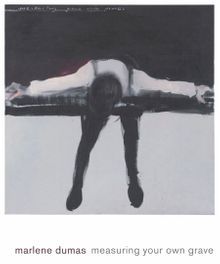 Marlene Dumas: Measuring Your Own Grave
Marlene Dumas: Measuring Your Own Grave
Published by D.A.P./Museum of Contemporary Art, Los Angeles.
Edited by Lisa Gabrielle Mark. Text by Cornelia H. Butler, Richard Shiff, Matthew Monahan, Lisa Gabrielle Mark.
Accompanying Dumas' first major mid-career survey in the U.S., with stops in three major American cities, (one yet to be announced) this substantial, fully-illustrated publication features a newly commissioned essay by renowned scholar Richard Shiff, placing the artist's work in relation to both American figurative painting since the 1980s and Abstract Expressionism. The book also includes curator Cornelia H. Butler's examination of Dumas' photographic sources and shorter texts by Lisa Gabrielle Mark and Matthew Monahan. Writings by the artist, as well as an extensive illustrated exhibition history and bibliography, complete this comprehensive examination of the work of one of the most thought-provoking artists working today.
Born in Capetown, South Africa, in 1953, Marlene Dumas has lived in Amsterdam since 1976. Over the last three decades she has had numerous solo exhibitions throughout Europe and the U.S., including the Tate Gallery, London; the Institute of Contemporary Art, Boston; and the Centre Georges Pompidou, Paris. In 1995 she represented The Netherlands at the 46th Venice Biennale.
PUBLISHER
D.A.P./Museum of Contemporary Art, Los Angeles
BOOK FORMAT
Hardback, 9.75 x 12 / 288 pgs / 200 color / 50 bw.
PUBLISHING STATUS
Pub Date 6/1/2008
Out of print
DISTRIBUTION
D.A.P. Exclusive
Catalog: SPRING 2008 p. 176
PRODUCT DETAILS
ISBN 9781933751085 TRADE
List Price: $55.00 CAD $65.00
AVAILABILITY
Not available
STATUS: Out of print | 00/00/00 For assistance locating a copy, please see our list of recommended out of print specialists |
 The Aesthetics of Risk: SoCCAS Symposium Vol. III
The Aesthetics of Risk: SoCCAS Symposium Vol. III
Published by JRP|Ringier.
Edited by John C. Welchman. Text by Jane Blocker, Douglas Crimp, Rachel Greene, Richard Shiff, et. al.
PUBLISHER
JRP|Ringier
BOOK FORMAT
Paperback, 6.75 x 9.5 in. / 416 pgs / 16 bw.
PUBLISHING STATUS
Pub Date 1/1/2008
Out of print
DISTRIBUTION
D.A.P. Exclusive
Catalog: FALL 2007 p. 141
PRODUCT DETAILS
ISBN 9783905770551 TRADE
List Price: $25.00 CAD $34.50 GBP £14.00
AVAILABILITY
Not available
STATUS: Out of print | 00/00/00 For assistance locating a copy, please see our list of recommended out of print specialists |
 Georges Seurat: The Drawings
Georges Seurat: The Drawings
Published by The Museum of Modern Art, New York.
Text by Jodi Hauptman, Karl Buchberg, Hubert Damisch, Bridget Riley, Richard Shiff, Richard Thomson.
PUBLISHER
The Museum of Modern Art, New York
BOOK FORMAT
Hardcover, 8 x 10 in. / 272 pgs / 165 color / 20 bw.
PUBLISHING STATUS
Pub Date 11/1/2007
Out of stock indefinitely
DISTRIBUTION
D.A.P. Exclusive
Catalog: FALL 2007 p. 168
PRODUCT DETAILS
ISBN 9780870707179 TRADE
List Price: $49.95 CAD $67.50
AVAILABILITY
Not available
STATUS: Out of stock indefinitely. |
 Plane Image: A Brice Marden Retrospective
Plane Image: A Brice Marden Retrospective
Published by The Museum of Modern Art, New York.
Essays by Gary Garrels, Richard Shiff, Brenda Richardson, Carol C. Mancusi-Ungaro and Michael Duffy.
PUBLISHER
The Museum of Modern Art, New York
BOOK FORMAT
Hardcover, 9.5 x 10.75 in. / 330 pgs / 260 color.
PUBLISHING STATUS
Pub Date 10/15/2006
Out of stock indefinitely
DISTRIBUTION
D.A.P. Exclusive
Catalog: FALL 2006 p. 5
PRODUCT DETAILS
ISBN 9780870704468 TRADE
List Price: $65.00 CAD $75.00
AVAILABILITY
Not available
STATUS: Out of stock indefinitely. |
 The Art Of Richard Tuttle
The Art Of Richard Tuttle
Published by D.A.P./San Francisco Museum of Modern Art.
Edited by Madeleine Grynsztejn. Essays by Madeleine Grynsztejn, Cornelia Butler, Richard Shiff, Katy Siegel, and Robert Storr. Texts by Tara McDowell, Elizabeth Smith, Adam D. Weinberg and Charles Wylie.
The Art of Richard Tuttle is published in conjunction with a major retrospective organized by the San Francisco Museum of Modern Art. The exhibition travels to the Whitney Museum of American Art, New York; the Des Moines Art Center; the Dallas Museum of Art; the Museum of Contemporary Art, Chicago; and the Museum of Contemporary Art, Los Angeles.
PUBLISHER
D.A.P./San Francisco Museum of Modern Art
BOOK FORMAT
Clothbound, 11 x 12 in. / 392 pgs / 265 color / 45 bw.
PUBLISHING STATUS
Pub Date 7/15/2005
Out of print
DISTRIBUTION
D.A.P. Exclusive
Catalog: SPRING 2005 p. 33
PRODUCT DETAILS
ISBN 9781933045009 TRADE
List Price: $65.00 CAD $75.00
AVAILABILITY
Not available
STATUS: Out of print | 00/00/00 For assistance locating a copy, please see our list of recommended out of print specialists |
 Donald Judd
Donald Judd
Published by D.A.P./Tate.
Essays by Rudi Fuchs, David Batchelor, Richard Schiff, Nicholas Serota, David Raskin, and John Jervis.
PUBLISHER
D.A.P./Tate
BOOK FORMAT
Hardcover, 9.5 x 12.25 in. / 288 pgs / 100 color / 30 bw.
PUBLISHING STATUS
Pub Date 3/2/2004
Out of print
DISTRIBUTION
D.A.P. Exclusive
Catalog: SPRING 2004
PRODUCT DETAILS
ISBN 9781891024894 TRADE
List Price: $65.00 CAD $75.00
AVAILABILITY
Not available
STATUS: Out of print | 11/25/2008 For assistance locating a copy, please see our list of recommended out of print specialists |
 Past Things And Present: Jasper Johns Since 1983
Past Things And Present: Jasper Johns Since 1983
Published by Walker Art Center.
Edited by Joan Rothfuss. Essays by Richard Shiff, Victor Stoichita, Foreword by Kathy Halbreich.
PUBLISHER
Walker Art Center
BOOK FORMAT
Hardcover, 8.5 x 11 in. / 144 pgs / 80 color
PUBLISHING STATUS
Pub Date 12/2/2003
Out of print
DISTRIBUTION
D.A.P. Exclusive
Catalog: FALL 2003
PRODUCT DETAILS
ISBN 9780935640779 TRADE
List Price: $34.95 CAD $45.95 GBP £30.00
AVAILABILITY
Not available
STATUS: Out of print | 8/15/2005 For assistance locating a copy, please see our list of recommended out of print specialists |
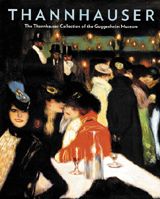 Thannhauser
Thannhauser
The Thannhauser Collection of the Guggenheim Museum
Published by Guggenheim Museum Publications.
Edited by Matthew Drutt. Essays by Jack Flam, Robert Rosenblum, Richard Schiff, Ann Dumas, Theodore Reff, Colin A. Bailey, Albert Boime, Beth Archer Brombert, Anne F. Collins, Elizabeth W. Easton, Michael Fitzgerald, Fred Licht, Joachim Pissarro, Belinda
PUBLISHER
Guggenheim Museum Publications
BOOK FORMAT
Hardcover, 9.5 x 12 in. / 224 pgs / 120 color / illustrated throughout.
PUBLISHING STATUS
Pub Date 7/2/2003
Out of print
DISTRIBUTION
D.A.P. Exclusive
Catalog: FALL 2003
PRODUCT DETAILS
ISBN 9780892072903 TRADE
List Price: $60.00 CAD $70.00
AVAILABILITY
Not available
STATUS: Out of print | 00/00/00 For assistance locating a copy, please see our list of recommended out of print specialists |
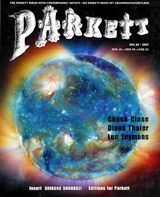 Parkett No. 60 Chuck Close, Diana Thater, Luc Tuymans
Parkett No. 60 Chuck Close, Diana Thater, Luc Tuymans
Published by Parkett.
Essays by Gerardo Mosquera, Sara Arrhenius, Jeremy Gilbert-Rolfe, Regina Hasslinger, Laura Hoptman, Francine Prose, Hans Rudolf Reust, Richard Shiff.
PUBLISHER
Parkett
BOOK FORMAT
Paperback, 8.25 x 10 in. / 250 pgs / illustrated throughout.
PUBLISHING STATUS
Pub Date 2/2/2001
Active
DISTRIBUTION
D.A.P. Exclusive
Catalog: SPRING 2001
PRODUCT DETAILS
ISBN 9783907582107 TRADE
List Price: $32.00 CAD $42.50
AVAILABILITY
In stock
in stock $32.00 Free Shipping UPS GROUND IN THE CONTINENTAL U.S. |
